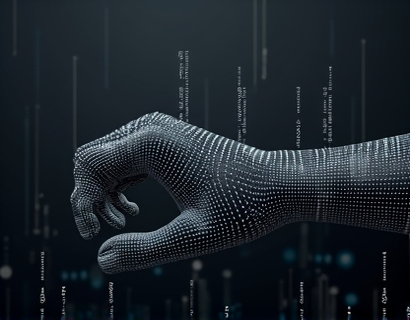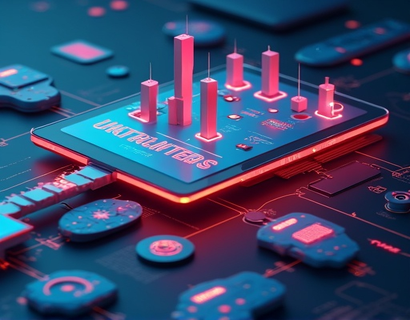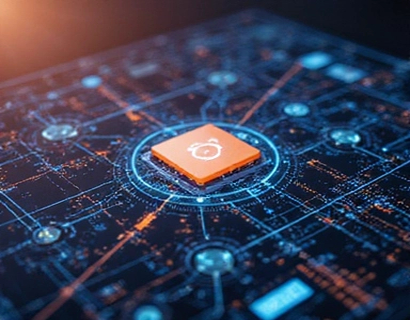Crypto and AI: Transforming App Ecosystems for Enhanced User Experiences with Advanced Digital Solutions
The integration of cryptocurrency and artificial intelligence (AI) is revolutionizing the app ecosystem, offering unprecedented opportunities for innovation and enhanced user experiences. This transformation is not merely a technological advancement but a paradigm shift in how digital services are designed, delivered, and interacted with. As tech professionals and early adopters, understanding the synergy between these two powerful technologies is crucial for harnessing their potential to drive future growth and user engagement.
The convergence of cryptocurrency and AI is creating a new frontier in digital solutions, where the transparency, security, and decentralization of blockchain technology meet the computational power and learning capabilities of AI. This fusion is enabling the development of applications that are not only more secure and efficient but also more intuitive and personalized. For developers and businesses, this means a chance to create apps that stand out in a crowded market by leveraging these advanced technologies.
Enhanced Security through Cryptocurrency
One of the most significant contributions of cryptocurrency to the app ecosystem is enhanced security. Traditional app development often grapples with issues related to data breaches, user authentication, and transaction integrity. Cryptocurrency, with its inherent cryptographic techniques, provides a robust framework for securing user data and transactions. By utilizing blockchain, apps can ensure that user information is immutable and tamper-proof, reducing the risk of fraud and unauthorized access.
Moreover, cryptocurrency-based payment systems eliminate the need for intermediaries, reducing transaction costs and speeding up processes. Smart contracts, self-executing contracts with the terms directly written into code, further automate and secure transactions, ensuring that all parties adhere to the agreed terms without the need for trust in a central authority. This level of security is particularly valuable in sectors such as finance, healthcare, and supply chain management, where data integrity and user trust are paramount.
AI-Driven Personalization and User Engagement
AI's ability to analyze vast amounts of data and derive meaningful insights is transforming how apps interact with users. By integrating AI into the app ecosystem, developers can create highly personalized experiences that adapt to individual user preferences and behaviors. This personalization extends beyond simple recommendations to encompass dynamic content generation, real-time support, and predictive analytics.
For instance, AI algorithms can analyze user interactions to identify patterns and preferences, allowing apps to tailor content and features accordingly. This not only enhances user satisfaction but also increases engagement and retention rates. In the realm of customer support, AI-powered chatbots can provide instant, context-aware assistance, reducing response times and improving user experience. These intelligent assistants can handle a wide range of queries, from basic FAQs to complex problem-solving, freeing up human support teams to focus on more intricate issues.
Decentralized Applications and User Empowerment
The rise of decentralized applications (dApps) is another exciting development at the intersection of cryptocurrency and AI. dApps leverage blockchain technology to operate on a decentralized network, eliminating the need for central servers and intermediaries. This decentralization empowers users by giving them greater control over their data and interactions within the app ecosystem.
AI enhances dApps by providing intelligent and autonomous functionalities. For example, AI can be used to optimize resource allocation, manage network traffic, and ensure the smooth operation of dApps. Additionally, AI-driven analytics can help developers identify and address potential vulnerabilities, ensuring the security and reliability of these decentralized applications. Users benefit from a more transparent and equitable system, where they have direct ownership and control over their digital assets and interactions.
Use Cases in Various Industries
The impact of combining cryptocurrency and AI is not limited to a single industry but spans across multiple sectors, each benefiting in unique ways. In the finance sector, decentralized finance (DeFi) platforms are redefining traditional banking by offering decentralized lending, borrowing, and trading services. AI algorithms enhance these platforms by providing sophisticated risk assessment, fraud detection, and portfolio management tools.
In the healthcare industry, AI-powered diagnostic tools integrated with blockchain can securely store and manage patient data, ensuring privacy and compliance with regulations. Smart contracts can automate insurance claims and drug supply chains, reducing administrative burdens and improving efficiency. In the retail sector, AI-driven recommendation engines combined with cryptocurrency-based loyalty programs can create highly personalized shopping experiences, driving customer loyalty and sales.
Challenges and Considerations
While the potential of merging cryptocurrency and AI is immense, there are several challenges and considerations that developers and businesses must address. One of the primary concerns is regulatory compliance. The rapidly evolving landscape of cryptocurrency regulations can pose significant hurdles, and ensuring compliance is essential to avoid legal issues. Additionally, the technical complexity of integrating blockchain and AI requires a skilled workforce, which can be a barrier for some organizations.
Another challenge is scalability. Blockchain networks, particularly public ones, can face scalability issues due to their decentralized nature. However, advancements in blockchain technology, such as layer 2 solutions and sharding, are addressing these concerns. On the AI side, ensuring the ethical use of data and algorithms is crucial to maintain user trust and avoid biases that could harm the app's reputation.
Future Trends and Innovations
Looking ahead, the integration of cryptocurrency and AI is poised to bring even more innovative solutions to the app ecosystem. One promising area is the development of AI-powered decentralized autonomous organizations (DAOs), which combine the autonomy of dApps with the decision-making capabilities of AI. These DAOs can operate with minimal human intervention, making them ideal for managing complex projects and communities.
Another exciting trend is the emergence of non-fungible tokens (NFTs) powered by AI. NFTs, which represent unique digital assets, can be enhanced with AI to create dynamic and interactive content. For example, AI-generated art and music can be tokenized and sold as NFTs, opening new avenues for creators and collectors. This fusion of NFTs and AI is set to revolutionize the digital art market and beyond.
Furthermore, the integration of Internet of Things (IoT) devices with blockchain and AI is creating smart, interconnected systems that can operate seamlessly. Smart homes, cities, and industries can benefit from this integration, with AI optimizing resource usage and blockchain ensuring secure and transparent data exchange.
Conclusion
The convergence of cryptocurrency and AI is transforming the app ecosystem, offering unparalleled opportunities for innovation and enhanced user experiences. By leveraging the security of blockchain and the intelligence of AI, developers can create applications that are not only more secure and efficient but also highly personalized and user-centric. As tech professionals and early adopters, embracing these technologies is essential for staying ahead in the digital landscape and driving future growth.










































